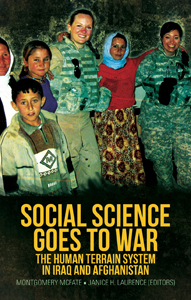Social Science Goes to War
The Human Terrain System in Iraq and Afghanistan
With a Foreword from General David Petraeus
An assessment of the US military programme in which anthropologists and other social scientists researched societies at war, by some of those involved.
Description
The Human Terrain System (HTS) was catapulted into existence in 2006 by the US military’s urgent need for knowledge of the human dimension of the battlespace in Iraq and Afghanistan. Its centrepiece was embedded groups of mixed military and civilian personnel, known as Human Terrain Teams (HTTs), whose mission was to conduct social science research and analysis and to advise military commanders about the local population. Bringing social science — and actual social scientists — to the wars in Iraq and Afghanistan was bold and challenging. Despite the controversy over HTS among scholars, there is little good, reliable source material written by those with experience of HTS or about the actual work carried out by teams in theatre. This volume goes beyond the anecdotes, snippets and blogs to provide a comprehensive, objective and detailed view of HTS. The contributors put the program in historical context, discuss the obstacles it faced, analyse its successes, and detail the work of the teams downrange. Most importantly, they capture some of the diverse lived experience of HTS scholars and practitioners drawn from an eclectic array of the social sciences.
Table of contents
Introduction – Unveiling the Human Terrain System
Montgomery McFate & Janice H. Laurence
Chapters
- Mind the Gap: Bridging the Military/Academic Divide
Montgomery McFate - An Anthropologist at War in Afghanistan
Ted Callahan - What Do You Bring to the Fight? A Year in Iraq as an Embedded Social Scientist
Katherine Blue Carroll - Playing Spades in Al Anbar: A Female Social Scientist among Marines and Special Forces
Jennifer A. Clark - The Four Pillars of Integration: How to Make Social Science Work in a War Zone
Kathleen Reedy - Realizing the Promise of Applied Social Science for Military Operations
James Dorough-Lewis, Jr. - Allied Civilian Enablers and the Helmand Surge
Leslie Payne - Assessing the Human Terrain Teams: No White Hats or Black Hats Please
Carolyn Fluehr-Lobhan & George R. Lucas, Jr. - Tangi Valley and the Limitations of Applied Anthropology in Afghanistan
Brian G. Brereton
Conclusion – The Human Terrain System: Some Lessons Learned and the Way Forward
Janice H. Laurence
Reviews
‘Laurence and McFate have produced an invaluable contribution to the literature examining the role of social sciences generally and anthropology in particular in assisting military operations, especially in counterinsurgency. This volume combines superb first-hand reports of how human terrain teams function with deep analytical and ethical analysis. First rate.’ — Martin L. Cook, Admiral James Bond Stockdale Professor of Professional Military Ethics, United States Naval War College
‘The Human Terrain System was one of the most interesting innovations in a Department of Defense that was unprepared for the counterinsurgency campaigns of this century. This book captures many of the lessons learned from that wartime adaptation–lessons that will be essential preparation for the counterinsurgency campaigns that are sure to emerge in the years ahead.’ — John Nagl, Ninth Headmaster, The Haverford School, and author of Knife Fights: A Memoir of Modern War
‘Social Science Goes to War is an extraordinarily important contribution to the literature on the recent US wars. McFate, a co-founder of the Human Terrain System, and the other authors, unflinchingly examine their efforts to help the US military understand the socio-political realities of Iraq and Afghanistan. The United States knew painfully little about these places, a deficit that fatally compromised the prospects for US-led counterinsurgency. The same knowledge will be needed if the US wishes help build the peace.’ — Linda Robinson, senior international policy analyst at the RAND Corporation and author of One Hundred Victories: Special Ops and the Future of American Warfare
‘Social Science Goes To War is an invaluable contribution to the history of the Iraq and Afghanistan wars. The authors in this volume risked their lives and their professional reputations to help military commanders make sense of the complex cultural landscape (the “human terrain”) that is counterinsurgency. These first-hand accounts of the day-to-day work of the human terrain teams provide a rich, readable record of one of the more controversial military innovations of the last decade.’ — Janine Davidson, Senior Fellow for Defense Policy at the Council on Foreign Relations
‘HTS was designed “to remedy the military’s lack of understanding regarding the people of Afghanistan and Iraq” … Montgomery McFate, one of the key anthropologists behind HTS, and the psychologist Janice Laurence … [have made] a significant attempt to fill this gap in knowledge … the narrative comes to life’ — Christine Toomey, The Times Literary Supplement
Editor(s)
Montgomery McFate is Professor at the US Naval War College in Newport, Rhode Island. Formerly, she was the Senior Social Scientist for the US Army’s Human Terrain System. McFate holds a PhD in Anthropology from Yale University, and a JD from Harvard Law School. She is the co-editor of Social Science Goes to War (2015).
Janice H. Laurence is a professor in the College of Education at Temple University and is an internationally recognised military psychologist.






